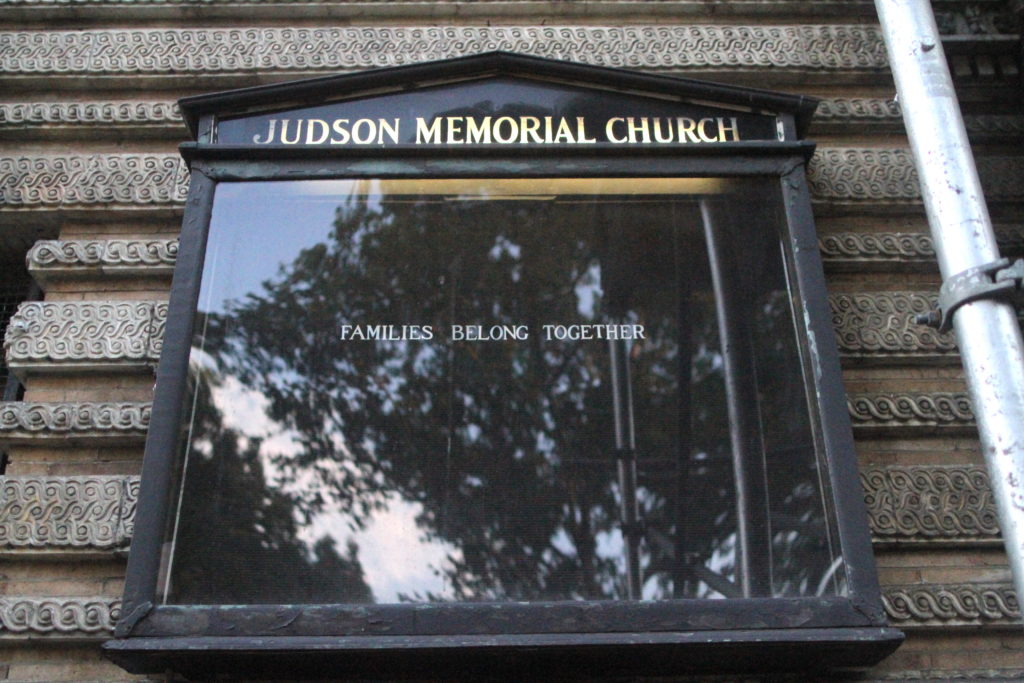Community
Activists: “Families Belong Together”
By Isabella Calix
Spectrum staff
Lee el version del Espanol aqui
The woman’s story silenced the room.
She is a wife, a mother of two and a registered nurse studying for her masters degree. She has built a life in the United States. U.S. Immigration and Customs Enforcement agents already took her passport. They have been in her home. They have a copy of her plane ticket. They monitor her phone calls, the woman said. On August 31, she must turn herself in to be deported.
After giving those answers to questions from the church leaders, lawyers, elected officials and activists inside the sanctuary of Judson-Memorial Church, she slumped into a chair. Her husband did, too. The woman stammered, crying with her face buried in her hands. “I’ve been fighting for 17 years.”
C.M.—her supporters inside that sanctuary would only identify her by those initials for her name—was referring to her efforts to legally reside in the place she calls home.
“We have more power than they do,” Ravi Ragbir, executive director of the New Sanctuary Coalition of NYC, said about immigrants like C.M. “Our faith leaders have more power than they do. Our community has more power than they do. So we have to stop this.”
Ragbir’s organization had arranged the gathering inside the church on Washington Square, where those gathered were discussing ways to support immigrants being detained and facing deportation under this current White House’s immigration crackdown. Ragbir and the other activists said they want to find a way to monitor detention centers and arrange for immigrants to be housed in churches, synagogues, mosques and other faith centers.
“One of the things that faith communities have are resources and people that are hungry to help now,” said Rabbi Stephanie Kolin of the Central Synagogue in Midtown Manhattan.
Judson-Memorial co-founded and initially housed the New Sanctuary Coalition, which still uses the church to train volunteers to accompany immigrants to check-ins with ICE and teaches congregations how to become immigrant sanctuaries.
Jane Treuhold, chair of Judson-Memorial’s immigration task force, noted how the coalition has evolved since it was established 11 years ago. “It started with just six families from different faiths … [W]e took them under our wing,” she said. “Now, the coalition has helped hundreds of families.”
Given the finite resources of 300-member Judson, the coalition had to move beyond the church. It’s “taken on a life outside of this,” Truehold said.
Following that recent coalition meeting, the Rev. Micah Bucey, one of Judson-Memorial’s ministers, told this reporter that faith communities should be involved in justice issues. “People are yearning … to act ethically,” Bucey said. “Progressive faith leaders can continue the effort to create a moral voice … ”
The day before the Monday meeting, at Judson-Memorial’s Sunday morning worship service, Bucey spoke about Jesus’ parables on how human beings are supposed to treat each other. “…[L]ittle stories about the kingdom of God [are] one of the only things consistently keeping me afloat as more and more terrible news about more and more slashings of our democracy continue to pelt us in the face every day.”
Also at that Sunday service, the Rev. Donna Schaper, Judson-Memorial’s senior pastor, expressed concern that the magnitude of the problem of immigrant family detentions isn’t fully known. “Frankly, information is terribly, terribly hard to get.”
“I feel like I’m drinking out of a fire hose, to be honest with you,” said State Sen. Brian Benjamin (D-Manhattan), who was at the meeting. He was responding to criticism that New York’s elected officials aren’t doing enough to ease the struggles of detained immigrants.
There are plans to do more than just meet. Some lawyers who had arrived at Judson-Memorial agreed to discuss how they can assist detained immigrants, especially children in New York without their parents. Without naming the detention center, Gustavo Gutierrez, an immigration attorney with the American Friends Service Committee, said children are being “yelled at. ‘Don’t hug, don’t touch, don’t touch,’ There’s trauma. They’re not helping the kids there.” He is representing some of the separated families.
Also at the meeting, several religious leaders said they might co-host a a candle lighting service to show support for the separated families.The coalition plans on holding a press conference in the coming weeks when more concrete plans are made within each sub-group of the attendees.


